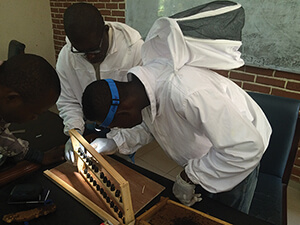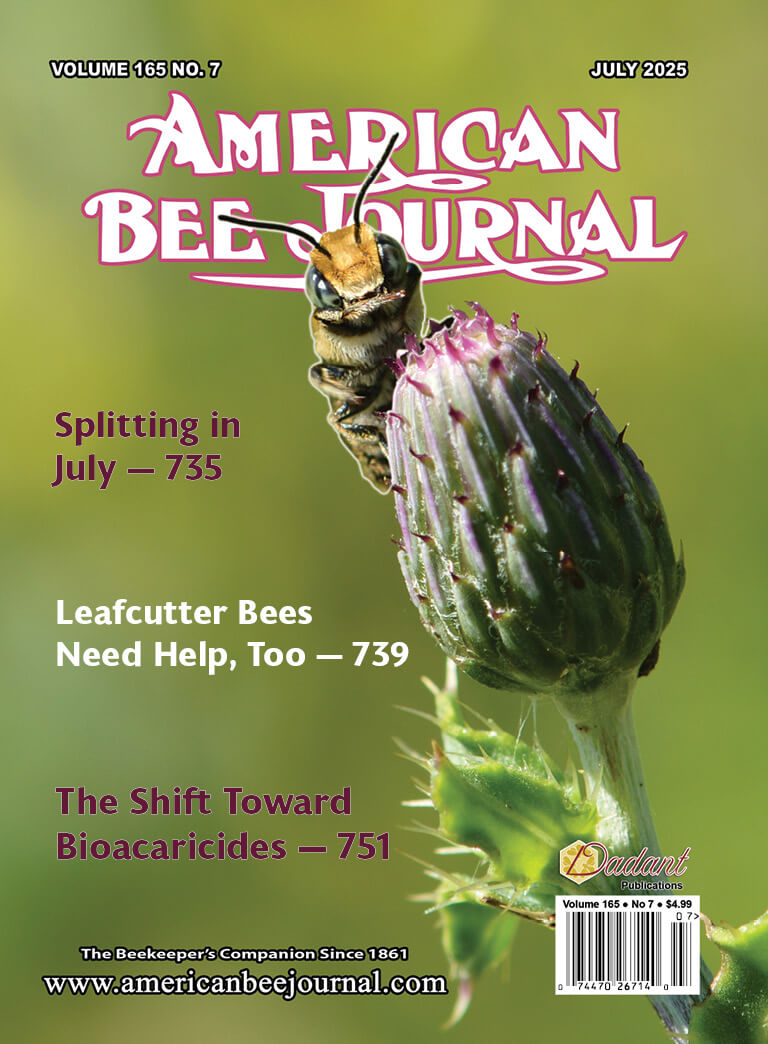
In June this year I was invited to visit Nigeria for three weeks to teach queen rearing at an agricultural college, Umuebe Farms and Farms College, in Abakaliki, Ebonyi State. I had heard, like most people, of the threat posed by Africanized “killer” bees in the southern U.S., and as West Africa is home to some very aggressive bees, I viewed my assignment with some trepidation. Within a few days of interacting with local bees and beekeepers, I formed the view that while beekeeping in the area of West Africa in which I was visiting has a lot of potential for development, this is held back only in part by the aggression of the bees. Lack of beekeeping knowledge by local people is another major detriment. For example, during my visit it was explained to me that if a local person wants a colony of bees, an empty Langstroth hive is placed in a field and the wait begins, usually around two years, for a feral swarm to enter and make a nest. There appears to be a gap in local knowledge as most seemed unaware that an existing colony might simply be split to make a second colony.
During my time at the College I found that the degree of aggression in bees varied considerably among colonies. Some of the fifty colonies owned by the farm were gentle and we did not use gloves when opening the hives, while others would attack en masse as we approached. Bees from the more aggressive colonies would continue trying to sting me 100 yards away from their hives. On one occasion we opened a hive near a field of crops and later in the day we were told that farm workers needed to leave the field as the bees were attacking them as a result of our earlier disturbance of the colony. After this incident we decided to inspect colonies only much later in the day after the farm workers had gone home. I did feel, however, that there were a sufficient number of less aggressive colonies to make it feasible to rear a line of gentle bees with a good selective breeding program.
Although most of the hives I saw were Langstroth, the Federal Government is considering buying 40,000 top bar hives from Kenya. During talks with Government procurement officers I stressed what I saw as the major benefits of Langstroth hives and the probable disadvantages of top-bar hives in the Nigerian setting. Langstroth hives are not much more expensive than top-bar hives, but have the significant advantage of using easily movable frames. It is easier to remove a Langstroth frame with minimal disruption to an aggressive colony than it is to remove a top bar where the comb has been attached to the side of the box. Detaching honeycomb from the box can result in some very agitated bees. Also, if a colony of bees only stores about 45 lbs. of honey each year, replacing most of the comb in their colony each year will use up a lot of their honey. Another consideration is: Why buy hives from Kenya when they could be made locally in Nigeria?
The main threat to European honey bee races such as Italians or Caucasians is that they need to store enough honey to survive winter. African bees generally have access to sufficient flowers throughout the year so that they do not need to store much honey. The result is that while a colony of European honey bees may store 100 to 175 lbs. of honey for the winter, honey bees in West Africa may only store 45 lbs. of honey. A selective breeding program may be able to increase this by 25% to 50% or more.
European honey bees are relatively gentle because they are not usually threatened by mammals. In Africa honey bee colonies are frequently attacked by mammals such as the honey badger or by lizards. Humans may also have a longer and more intrusive history with African bees, again resulting in more defensive behavior. In order to defend their nests African bees have evolved to attack potential threats en masse, often by thousands of bees at a time. If there is another colony less than five yards away, they too will join in the attack. This makes keeping bees difficult since hives need to be kept away from habitation and widely dispersed, which is not an efficient way to keep bees. Selective breeding for gentleness could help minimize this risk.
The main challenge with a breeding program is to determine how best to position drone colonies. Any future visit to the college will need to include time inspecting potential queen rearing sites where drone colonies can be placed for optimal mating.
The college where I stayed included a working farm. The director told me that he would like to increase the number of hives from 50 to over 1,000 since there is a shortage of local honey in Nigeria. In fact 98% of the honey sold in Nigerian supermarkets comes from the U.S. Umuebe Farms has a good reputation for producing high quality food and would have no difficulty selling any honey that they produced.
Although local honey is sold in markets, consumers do not trust the quality or safety of the honey. While I was in Nigeria a person found a feral nest and killed it with insecticide. Later he harvested the honey and sold it at a market. The family who bought it was admitted to the hospital seriously ill with pesticide poisoning. The opportunity to buy honey from a reputable local supplier such as Umuebe Farms would considerably improve people’s confidence in the quality and safety of the product.
Nigerian honey is thick and almost black. The bottle I returned home with has a ….


